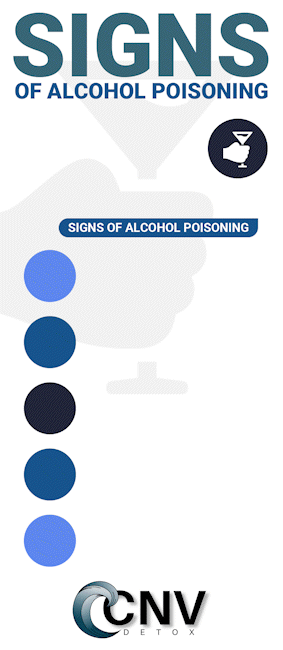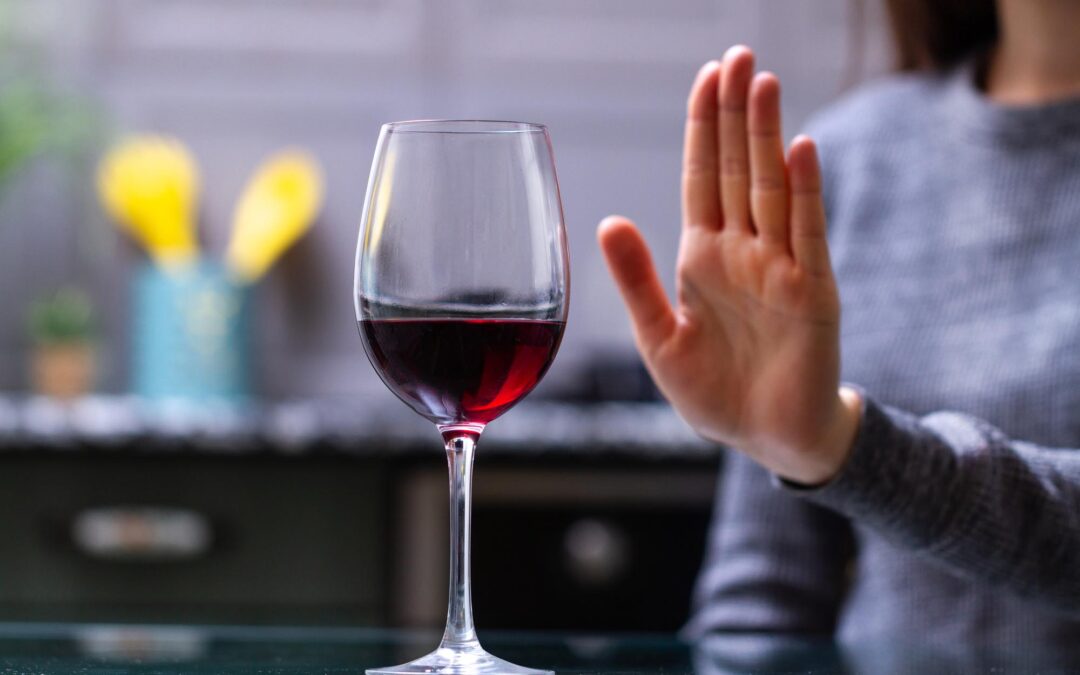If you or someone you’re with starts showing signs of alcohol poisoning, or they just don’t seem to be OK, you need to monitor them in case they need medical attention. Call 911 immediately if they show any signs of alcohol poisoning. Many illicit drugs and medications react negatively to alcohol. When treating alcohol poisoning, make sure to note how much the person drank, what they drank, and when.
The best thing to do is give the paramedics or doctors the rest of the drugs that were taken if the person also abused other substances. This way they could be tested to see if the drugs have impurities or have been tainted. The same is needed if the person is on legal medication.
We at CNV Detox are committed to helping you or a loved one find the strength to be able to say no to alcohol and start their road to recovery. We will help you no longer wait for those flashing lights.
What is Alcohol Poisoning?
Alcohol poisoning happens when someone has too much alcohol. This takes over the bloodstream and thus starts impacting parts of the brain that control important functions, including temperature, heart rate, and breathing.
Alcohol poisoning usually occurs when someone has had too many drinks. However, in some cases, it can also happen by consuming ethanol through household products by accident.
One standard drink contains about 14 grams of pure alcohol, or:

- 12 fluid ounces of beer
- 8-9 fluid ounces of malt liquor
- 5 fluid ounces of table wine
- 1.5 fluid ounce shot of distilled spirits
How quickly someone drinks plays a role in developing alcohol poisoning and going through the levels of intoxication.
How Binge Drinking Can Lead to Alcohol Poisoning
As a major cause of alcohol poisoning and related death in the U.S., binge drinking can be extremely dangerous. Binge drinking is five or more drinks in two hours for men, and four drinks in two hours for women. People between ages 35 and 64 suffer the most from alcohol poisoning in the U.S. This is surprising considering the fact that binge drinking is usually associated with college students. In addition, 90% of binge drinkers who have had alcohol poisoning weren’t alcohol-dependent.
The Signs of Alcohol Poisoning
There are several signs of alcohol poisoning. Just because someone doesn’t show all the signs does not mean they are not suffering from alcohol poisoning.
- Won’t wake up even if you shake them, pinch them, or try to wake them up in any way
- Skin can be cold, clammy, bluish, or blotchy
- Slow breathing (eight breaths or fewer per minute)
- Lapses in breathing (10 seconds or more between breaths)
- Confusion, stupor, or coma
- Rigid spasms, seizures, convulsions
- Vomiting while unconscious or asleep and they do not wake up
How Many People Die of Alcohol Poisoning a Year?
Roughly six people a day in the United States die from alcohol poisoning. 76% of people who die from alcohol poisoning are men. 10.7% of children ages 17 and younger live with a parent who has an alcohol use disorder. It also plays a part in thousands of deaths of people ages 21 and younger. This includes 596 suicides. Some people who have other mental health disorders try to use alcohol to self-medicate. It can work for a while but the person will need more and more alcohol to medicate. This can make going down the path of addiction very likely. After a time it gets to be too much for many people. This is why seeking help for all mental health conditions is important.
How Does Alcohol Poisoning Happen?
There are seven steps that lead to alcohol poisoning. Once you learn these steps, you can be better equipped at treating alcohol poisoning.
The Levels of Intoxication

Sober: Low Level Intoxication
At this stage, the person feels like themselves. This is generally at one or fewer alcoholic drinks. Please bear in mind that due to the tolerance people with alcohol addiction disorder might have to drink more to get the same effect.
Euphoria
This is the point where alcohol becomes more of a “social lubricant” that makes people feel more at ease and talkative. Part of this might be because at this stage you have lowered inhibitions. At this point, the BAC (blood alcohol content) might be or starts to get close to .08, which is right at the legal limit to operate a car in the United States. If you’re in the United States and your BAC is .08 or above, you can be arrested for drunk driving if you try to drive.
Excitement
Emotional instability might start. You might start making poor choices and you might not remember what you did. You can lose your balance easily and your vision might become blurry. You might not be able to feel pain and can lose a lot of coordination.
Stupor

You might have seizures, lose control of bodily functions, and have blue-tinged skin. You will also not be able to breathe normally. Your gag reflex will not work. If you start choking on your own vomit, you could become seriously injured. You should get medical attention. The person might have more alcohol in their stomach that has not passed into their bloodstream yet. The body does not stop absorbing alcohol from the stomach or lower intestine if someone blacks out or goes into a coma.
Coma
When someone goes into a coma because of alcohol poisoning or any other reason, it’s very important to get immediate medical attention.
Death
A BAC of 0.4 or above is usually fatal. Even if you’ve built up a high tolerance for alcohol, you can still get alcohol poisoning.
When Can People Develop Alcohol Poisoning?
Alcohol poisoning isn’t limited to parties. Many people who have an alcohol abuse problem hide their drinking, will drink alone, will drink to self-medicate, and they might mix medication such as legal or illegal sleeping pills believing that alcohol is needed for them to be able to fall asleep. Someone with a substance abuse disorder cannot stop abusing substances if they want to without help. This means even if they are taking a medication that interacts with alcohol they will not be able to stop drinking in order to take the medication safely.
Treating Alcohol Poisoning
Alcohol poisoning must be treated immediately. The first thing you need to do when you see someone with alcohol poisoning is to call 911. In the meantime, you should do the following:
- Attempt to keep the person awake
- Keep the person in a sitting position
- Give the person water if they can take it
You should not:
- Lie them on their back
- Give them coffee (caffeine will make dehydration worse) or more alcohol
- Make them walk
There is also a position called the Bacchus Maneuver that can help in the short term.
The Bacchus Maneuver
In the Bacchus Maneuver:
- If the intoxicated person is on their back, you should put their arm closest to you on the ground above their head. Be prepared to roll them onto their stomach.
- Roll the person toward you. Their arm should be above their head, not under it.
- Tilt their head to maintain a proper airway. Tuck the hand nearest to you under the head to maintain the tilt and keep their face off the floor.
The Bacchus Maneuver is more effective than “backpacking,” which involves putting a backpack on the person so they won’t roll over onto their back and choke on their own vomit. This doesn’t guarantee that their airway is clear, and it can create a false sense of security. The people around the person who is passed out might stop monitoring them.
Although the Bacchus Maneuver can help to a degree, it’s not a substitute for proper medical attention. You must also call 911.
Doctor-Patient Confidentiality Applies to Alcohol Abuse and Underage Drinking

Your doctor cannot tell the police or other authorities that you or the other person drank while underage or did drugs. Doctor-patient confidentiality applies unless they have a reason to believe that you will harm yourself or someone else. However, if your medical professionals don’t know that you drink, they might not be able to treat your condition effectively. This applies even if the problem isn’t alcohol-related. Many medications react negatively with alcohol such as many diabetes and high blood pressure medications.
Disclose All Medications to Your Doctor
Most depressants such as heroin or Xanax do more harm when mixed with alcohol than alcohol alone. Certain medications make the effects of the alcohol stronger. This means that a person might get alcohol poisoning even if they do not drink as much as they usually do. You cannot get in trouble telling your doctor if you consume alcohol, even if you cannot stop. Doctor-patient confidentiality protects you.
It’s unlikely that your friends and family do not already know that you have a substance abuse problem though. If you think that your loved one hasn’t told their doctor about their inability to stop drinking, you can pull the medical professional aside and inform them. Don’t let your loved one’s denial potentially cost them their life.
We Are Here to Help
When you are ready to start your road to recovery, you’re ready to stop having to worry about when those flashing lights will come. It’s important to get your friend or anyone else you might be around proper medical attention if you see any of the signs of alcohol poisoning. It’s better that they wake up mad than not at all.
CNV Detox can help treat alcohol addiction. Please contact us and let us help you and your loved one.





